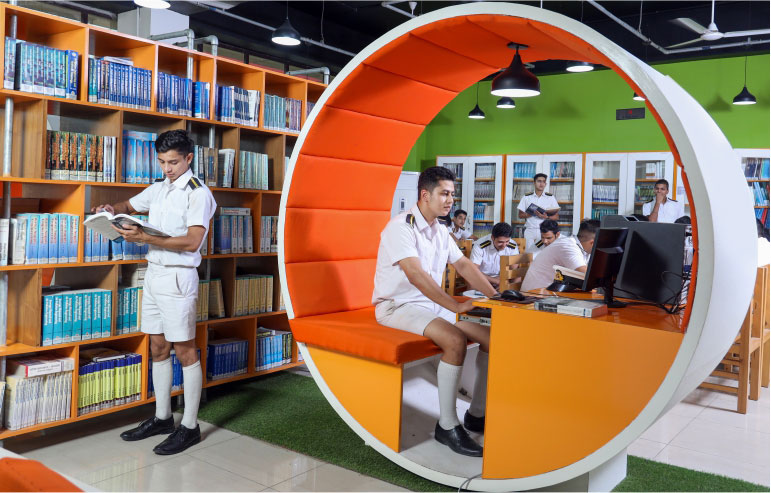Nautical Science is one of the emerging streams in the Maritime Industry. It deals with navigation, cargo operations, maintenance of merchant navy ships, etc. A Bachelor of Science in Nautical Science is a good start for anyone who’s willing to make a career in this field. BSc Nautical Science at Chitkara University is a 3-year residential program with 12 months of internship on board the merchant navy ships. But what to do after BSc in Nautical Science? What are the future options and career scopes in this stream? In this article, we’ll navigate your career path and dive into the details of what can be done after obtaining a BSc in Nautical Science degree: –
Pursue Higher Studies
After graduating in Nautical sciences, one can pursue higher studies in different specializations in Maritime Industry such as Shipping, Maritime Law, Maritime Trade Management, Oceanography, etc. Some of the popular courses after BSc in Nautical Science are as follows: –
- MSc in Shopping, Trade, and Finance
- MBA in Maritime and Shipping
- MSc Maritime Affairs
- MSc Maritime Policy and Shipping
- Maritime Law, LLM
- MSc Nautical Sciences
- Post-Graduation Diploma in Logistics and Shipping
- Pre-Sea Training for Graduates
- Higher National Diploma in Nautical Science
- Medical First Aid
The admissions to most of these courses are by competency examinations carried out by the prestigious Ministry of Surface Transport along with the Directorate-General of Shipping (DGS), Mumbai.
Job Opportunities
A BSc degree in Nautical Science will give you many options for employment in the Maritime Industry. The world relies upon the Maritime Industry and thus it is a strong market to work in. An internship is an essential part of becoming a certified Marine Deck Officer. At Chitkara University the cadets complete 12 monthly internships on board Merchant Navy Ships. This provides exposure to shipping environments to the students. They also develop practical skills in operations, maintenance, safety, and navigation.
With a Nautical Science Degree, one can get an opportunity to work in different Maritime Industries on different types of vessels such as container ships such as Cruise Liners, bulk carriers like ferries oil and gas tankers, Liquid Cargo Ships, passenger vessels, off-shore vessels, naval ships, special purpose vessels, etc.
After 3 years of BSc in Nautical Science and certification of competency (second mate), aspirants can join as 2nd or 3rd officer in any national or international shipping organization.
Read More: Future Scope of Nautical Science in 2023
Different job profiles after BSc in Nautical Science are as follows: –
Deck Cadet
After joining a ship as a Deck Cadet, one must carry out many duties like bridge watching, deck work, cleaning, maintaining log books, etc. Later on, a deck cadet performs the task of navigation. It is the most important aspect of a ship. Tank sounding i.e., measuring the number of fluids in the tank of the ship is another task performed by the deck officer. This comes under Deck maintenance. LSA (Life Saving Appliances) and FFA (Fire Fighting Appliances) maintenance is a major task on the ship. Deck cadets are expected to assist the 3rd officer in this task. Deck cadets are also involved in the paperwork on the ship, berthing and unberthing operations, mooring operations, etc. The average salary of a Deck Cadet in India as a beginner is ~3LPA.
Third Officer
The third officer is the ship safety officer. The third officer is in charge of the LSA and FFA. Correction of radio signals is also one of the key responsibilities of the third officer. The third officer keeps a track of GMDSS (Global Maritime Distress and Safety System) tests and records. Maintenance of ship’s recreational and technical libraries, preparation of port papers, maintenance of all signaling apparatus and shapes, correction and maintenance of nautical publications, taking charge of mooring and unmooring operations, etc. The average salary of a Third Officer in the Merchant Navy is 6-8 LPA.
Chief Officer
Chief Officer is considered as the chief of the Deck Department. They make plans for the day and assign work to the junior officers. They work just under the captain. They are responsible for safety planning, loading, storage, care, and discharge of cargo. They supervise and direct the cargo operations making sure that the stresses and stability of the vessel are always within the limit. Maintenance of oil spills response equipment is also an important role of the Chief Officer.
Master (Captain)
The Master is the head of the whole vessel and the highest authority in the sea. They are in charge of the safety of the crew, vessel, and cargo. They make sure that all the national and international laws are followed properly and all the management policies are fully compiled. They ensure that proper and accurate records are kept by the vessel and are made available to shore authorities as and when needed. This is a high-pressure, powerful and responsible job.
Overall, the people in Merchant Navy travel the world and explore new places. The maximum income earned by them is tax-free, hence saving a lot of money. The food and living costs are handled by the company itself and thus there is no price for living on the sea. Merchant Navy is one place where a person gains a lot of respect and has adventures and experiences for life. But on the other hand, like all the jobs, it demands determination and a strong work ethic. If you think that you own these qualities or willing to develop them then the School of Maritime Studies, Chitkara University is the right place for you. It offers a 3-year BSc NauticalScience degree with 12 months internship on board Navy Ships. It equips its students with the right knowledge, skills, and attitude.






